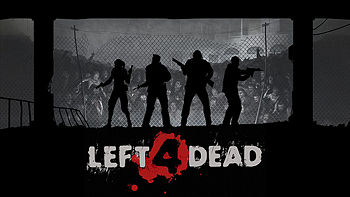Left 4 Dead
Left 4 Dead is a zombie horror/survival, first-person shooter video game, published by Valve Software, available on the Xbox 360 and PC. The game utilizes the Source Engine, a powerful 3D game engine that was used by Counter-Strike and Half-Life. Released in November 2008, the game saw immediate praise and success, as it sold nearly 2 million copies in its first few months. [1]
Gameplay
There are two main gameplay modes in Left 4 Dead, Campaign, and Versus.
In Campaign mode, four players team up, and play as a group of surviving characters, whom, for some reason, are immune to the zombie outbreak. The game is designed to play out just like a zombie horror movie: Your goal is to navigate through the area, which has been completely devastated by the zomies, and escape to safety. Doing so will require the survivors to stay together and work as a team. Left 4 Dead is not a simple run and gun type game, where you just shoot everything that moves. There are several zombies that have special types of attacks, which are devastating to a survivor caught alone. These zombies are named "Boss infected". (For example, one zombie pounces on top of you and his weight leaves you completely helpless, requiring a teammate to shoot him team or knock him off of you. Another vomits on you if you stay too close, or kill him too close, and the bile attracts a massive horde of zombies that attack. Teamwork is absolutely essential to surviving.
To survive this onslaught of zombies, the survivors are equipped with Guns (shotguns, machine guns, and pistols). Also available are homemade pipe bombs and Molotovs. Individually, the Zombies are fairly weak and easy to kill with the guns, but in numbers can be devastating.
There is also a Versus mode, which accommodates up to eight players, in 2 teams of 4 players each. The teams take turns playing as the survivors, and the Boss Infected. When playing as the Infected, you are given access to their special attacks, and your goal is to kill the players on the survivor team before they reach safety.
The game features four unique maps, each of which, on average, take 45 minutes to an hour to complete. Each map is divided into 5 "stages". Each stage ends with players reaching a safe house, where they cannot be attacked by zombies and player infected in Versus. This ensures that players get a fair chance to rest a few moments at times during a campaign, as well as heal and replenish ammo, etc.
Left 4 Dead contains a very innovative feature called the AI Director, which can be thought of as the Director of the "movie" you are in when playing a campaign. The AI Director ensures that no two playthroughs of a campaign are the same. In each game, the AI Director randomizes the locations in the game in which Zombie mobs and boss infected appear, as well as locations where weapons are made available. This makes each experience unique, as you can never know for sure whether there is a massive zombie mob around the next corner or not. The AI Director also alters the gameplay on-the-fly during a campaign, based on what is happening. For example, if the group of survivors is slacking around and not moving to the next area within a reasonable amount of time, the director will spawn a massive horde of zombies to come attack them. If the players are having a really tough experience, the Director will periodically thin out the zombie attacks and give the survivors a fair chance to recover.
Awards Won
- IGN – Best Online Multiplayer Game of 2008, for PC and Xbox 360; Best Use of Sound, Best Shooting Game, for PC.
- GameSpot – Best Cooperative Multiplayer of 2008; Best Shooter of 2008;
- Maximum PC – Game of the Year

